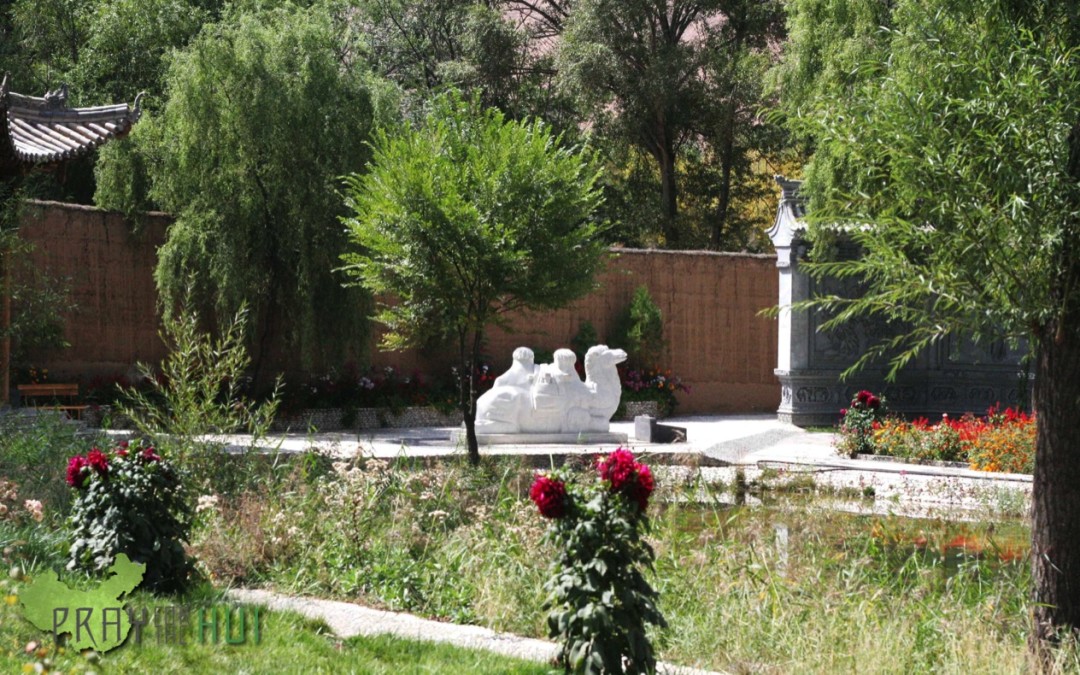In the Eleventh Century, two brothers led a group of Salar people from the Oghuz Turks tribe, fleeing from persecution in their hometown in Samarkand, which is located in today’s Uzbekistan. As they searched the desert for a new place to settle, the group suffered great hardships, but they all believed Allah would guide them to their final destination; these people were all Muslims. The two brothers thus strapped the Quran over a camel’s head and asked Allah to make the camel their guide and lead them to wherever Allah wanted them to settle. (The Quran said to have been carried by this camel is currently preserved at the Jiezi Mosque.)
As the story goes, one night, an Imam from the group dreamed of a beautiful, gushing fountain, and miraculously, the next day, the group came to a very similar fountain. The camel with the Quran on its head sat by the fountain and drank, and then all of a sudden, the camel turned into stone, which amazed the whole group. Treating this event as a divine sign from Allah, the group stopped traveling and built up their new home at what we now call Jiezi, a town located in Xunhua County of Qinghai Province in China.
In 1781, the Qing armies crushed a Salar uprising, which resulted in the slaughter of as much as 40% of the Salar population. Their numbers increased over time, however; they intermarried with other ethnic groups like the Mongolians, Han Chinese, Tibetan, and Hui, and they eventually became a distinct minority group in China. According to the 2010 census, there are at least 130,000 Salar people in China, and according to data collected from Operation China, approximately 113,000 Salar live in north central China. More than 70% are located in Xunhua County. Additional communities are located in neighboring Gansu Province, and a smaller amount of Salar people, approximately 1,400, live in Yining County of Xinjiang, a vast distance from the main body of Salar.
Their primary language is, as one might guess, Salar, a kind of celestial Turkish language. Although many older generations speak Salar, the current generation is fluent in Chinese, and due to their interaction with other ethnic groups, the Salar are often bilingual or multilingual. The vast majority of the Salar people are Muslim, while a very, very small number are Christian. They are also a patriarchal people, with mosques at the centers of their communities; their daily lives are strongly attached to these mosques’ religious activities.
No church has ever been established, though today there is a small group of Salar attending a Han Chinese church. For followers of Jesus who desire to live among the Salar, long term commitment and sacrifice are essential due to the hardships and rigorous environments where the Salar often live. But the Lord provides for His children, so let those who feel His call come to the Salar, live with them, and teach them His Word!
And they sang a new song, saying: ‘You are worthy to take the scroll and to open its seals, because you were slain, and with your blood you purchased for God persons from every tribe and language and people and nation.’ Revelation 5:9
Pray for the Salar people, that they will be given opportunities to read and hear about Jesus’ life and that their lives will be touched and transformed. Pray that more of God’s workers will come and join together to build relationships with the Salar and be strong witnesses of Christ.

